Book club: Inside a top editor’s ‘Collision’ with Trump and Bezos
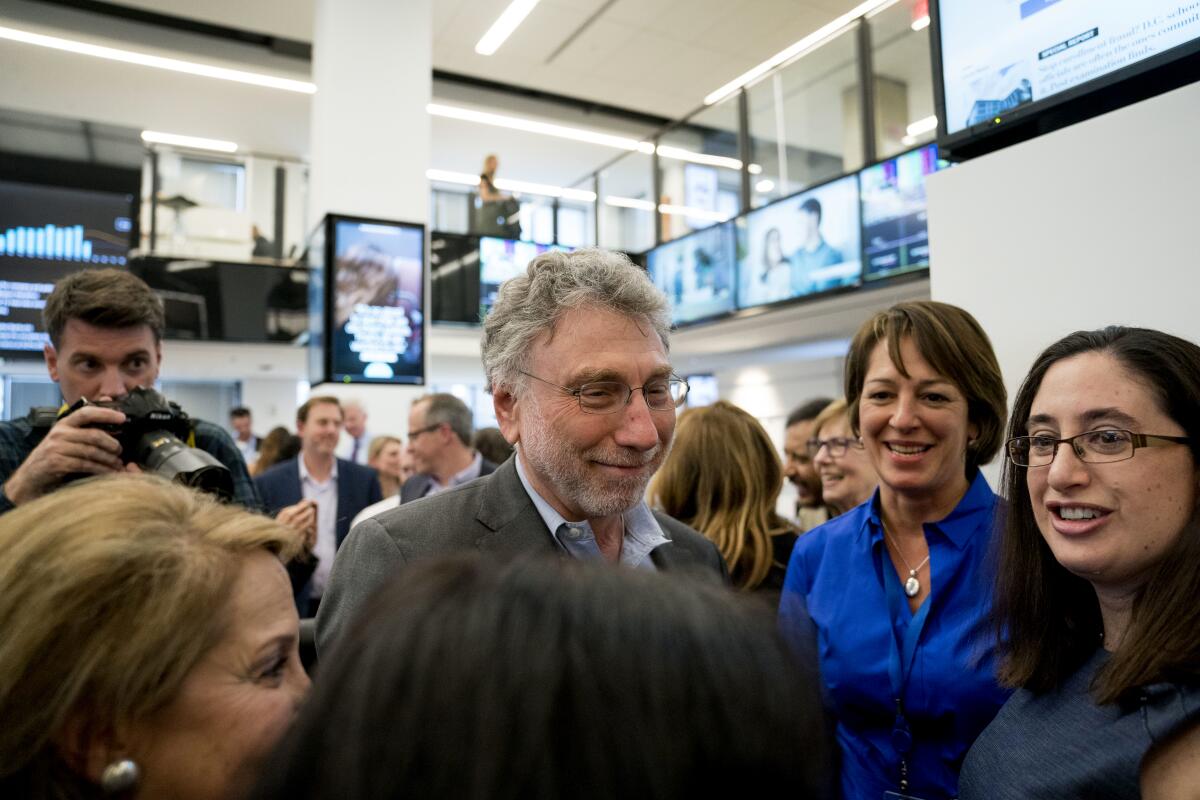
Good morning, and welcome to the L.A. Times Book Club newsletter.
This month we’ve been talking about power and disruption while reading two timely nonfiction books. Walter Isaacson opened up Sunday in El Segundo about the stories and controversy behind his bestselling biography “Elon Musk.” (More about that later)
On Wednesday, former Washington Post Editor Martin Baron will join the L.A. Times Book Club to talk about “Collision of Power,” a revealing account of his eight years leading the Post newsroom during a uniquely tumultuous era.
Baron recounts Donald Trump’s ceaseless attacks on writers and editors, the takeover by Amazon founder Jeff Bezos that set the Post on a path of digital transformation, the deliberations behind explosive coverage topics and struggles with his staff that nearly led Baron to walk away.
The book begins with high drama: a secret dinner at the White House shortly after Trump took office with the president, Baron, Bezos and two other top Post executives. As Trump blasted the press and the Post in particular over cheese souffle and pan-roasted dover sole (“his list of grievances appeared limitless”), he punctuated each utterance by poking Baron’s shoulder with his left elbow. “The physical jabs were annoying but harmless,” Baron writes. “Yet they were a hint of hard punches to come.”
Baron says he had no interest in producing a personal memoir, instead choosing to write “Collision of Power” as a witness to history. “I don’t think that my life is all that interesting,” he tells Times reporter James Rainey. “The exception is what I have done in public life. That’s what I felt was important. That’s what I think is consequential. I think people are entitled to know why I made the decisions I did as the executive editor.”
Before running the Post, Boston Globe and Miami Herald, Baron worked from 1979 to 1996 at the Los Angeles Times as a reporter, business editor, Column One editor and editor of the Orange County edition. The 2015 Oscar-winning film “Spotlight” showcased how Baron and the Globe staff exposed a molestation scandal in the Catholic Church. Actor Liev Schreiber, who played the editor on screen, narrates the audio edition of “Collision of Power.”
“It’s important for Americans to understand how much newspapers and news organizations are in peril and to read the thoughts of a guy struggling with the place of journalism, going forward,” says former New York Times editor Dean Baquet. “Plus, it’s just a good read.”
Published Tuesday, “Collision of Power” already has drawn extensive coverage, including an Atlantic excerpt explaining How We Got Democracy Dies in the Darkness. Here’s what people are saying:
Vanity Fair: “Baron’s profound admiration for Bezos was one of my main takeaways from Collision of Power,” writes Joe Pompeo, after visiting the author at home in the Berkshires.
Seattle Times: “Ever since Jeff Bezos bought The Washington Post a decade ago, people wondered if the Amazon founder would find a magic formula for newspapers to survive in the new millennium,” says Brier Dudley. “The answer appears to be ‘not yet, but there’s hope.’”
New York Times: Baron “chronicles an era when disruptions from the internet (and now artificial intelligence) have profoundly shaken journalists’ confidence in the survival of their craft and the stability of their livelihoods,” says Sewell Chan, editor of the Texas Tribune.
Washington Post: ”He is a great editor who led his newsroom to do some of the best newspaper work of our time. No doubt, those qualities also come with an impulse not to leave anything out, no matter how unflattering,” says Kyle Pope, editor and publisher of the Columbia Journalism Review.
On Wednesday, Baron returns to Los Angeles to discuss “Collision of Power” at USC with Times Executive Editor Kevin Merida, a former Post managing editor.
Book club night begins at 6 p.m. PT and is presented in partnership with the USC Annenberg School for Communication and Journalism. You can join in person or virtually. Get tickets.
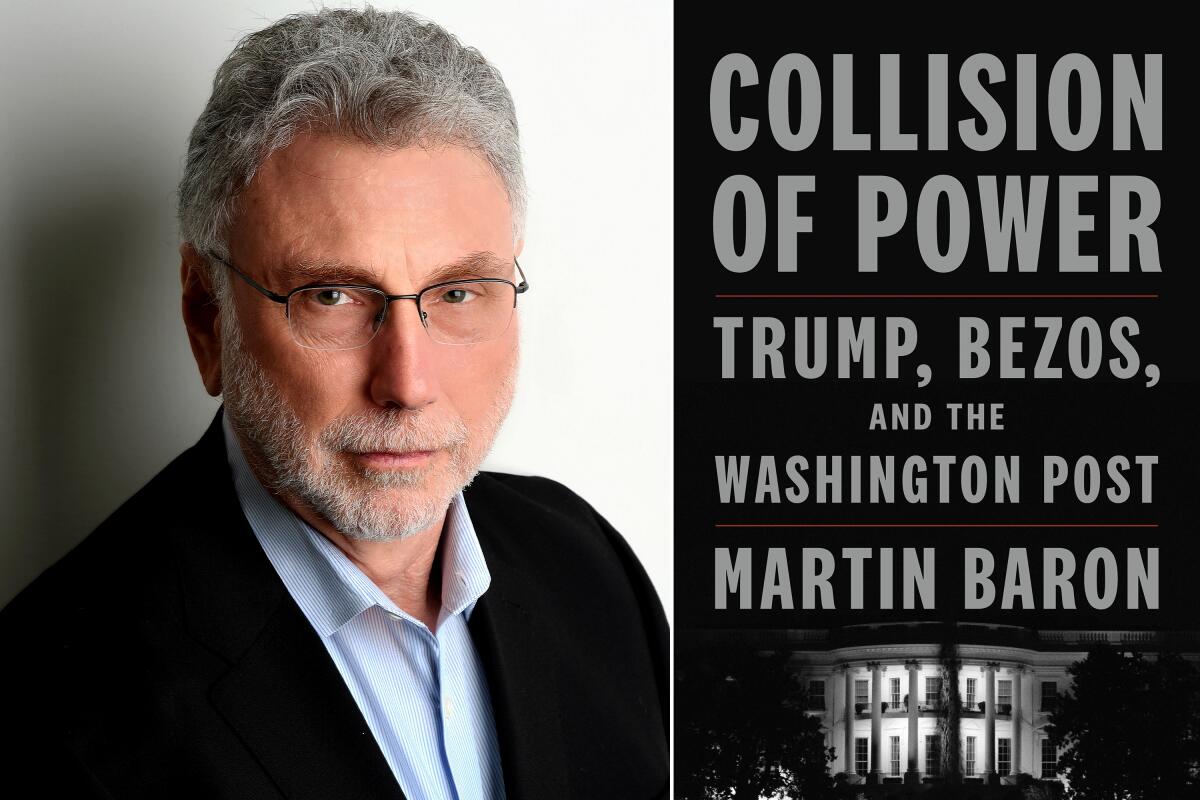
Tell us: As you read along this month please share questions and comments in Eventbrite at signup or send an email to [email protected].
What’s next?
The disruption continues: Join us Nov. 14 for AI Night at the L.A. Times Book Club. This virtual event features two authors doing pioneering research into the perils and possibilities of artificial intelligence.
Joy Buolamwini, founder of the Algorithmic Justice League, is the author of the upcoming “Unmasking AI: My Mission to Protect What Is Human in a World of Machines.” Fei-Fei Li, founding director of the Stanford Institute for Human-Centered AI, has written “The Worlds I See: Curiosity, Exploration, and Discovery at the Dawn of AI.”
Buolamwini and Li will join Times audio head Jazmín Aguilera at 6 p.m. PT on Nov. 14 to discuss their groundbreaking work and books published this fall. Get tickets.
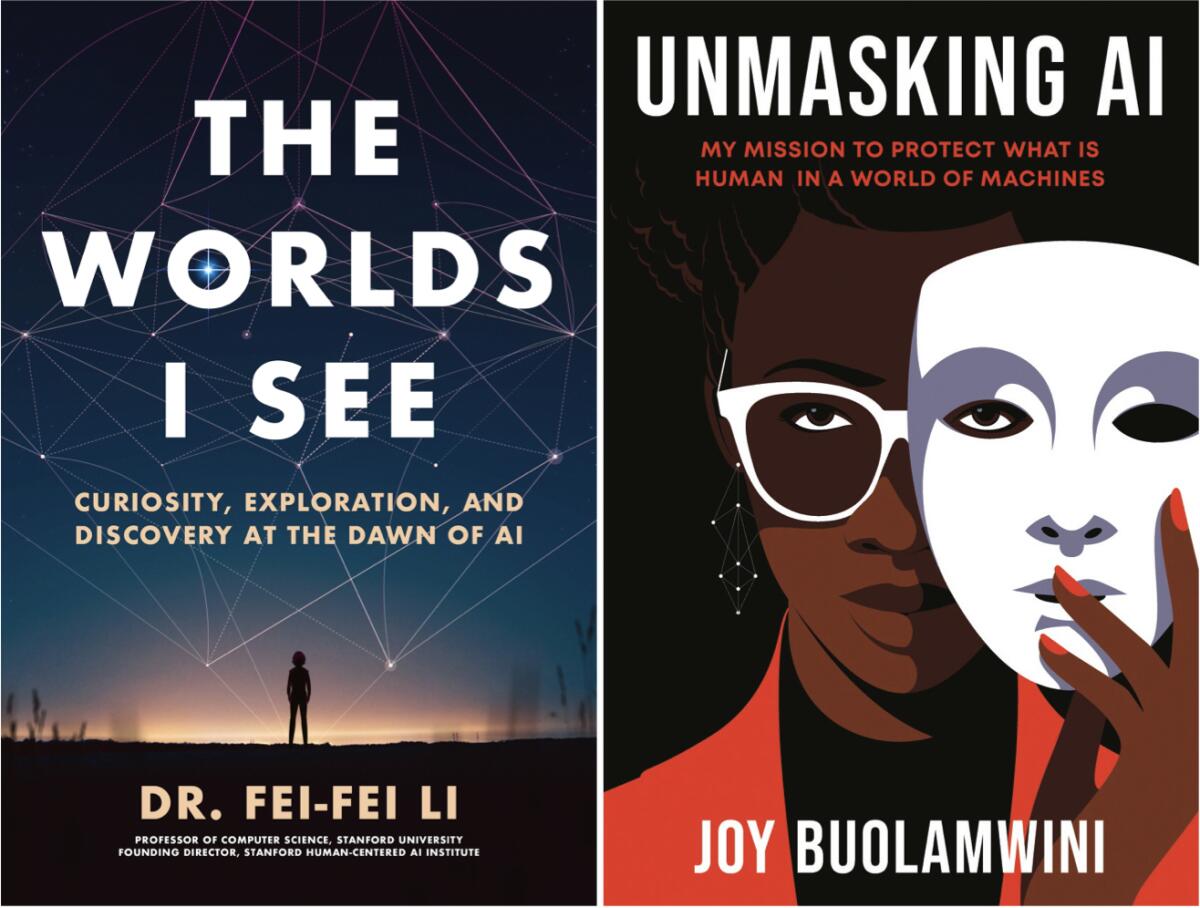
Keep reading
(Un)fair use: Columnist and author Michael Hiltzik writes about discovering that three of his books were used to train an AI chatbot. He notes that the reactions of fellow authors have been all over the map on the subject and discusses legal battles underway. “In my case,” Hiltzik says, “the sad truth is that however rigorously LLaMa was ‘trained’ with my books, it didn’t seem to have learned much.”
Nobel connections: Norwegian author Jon Fosse earned the Nobel Prize for literature on Thursday. It was a major boost for Transit Books, the small Bay Area publisher that launched his international fame. What can readers expect next? “‘A Shining’ is a great place to start for readers new to Fosse’s work,” says publisher Adam Levy. “It’s a slim, dreamlike novel about a man who finds himself stuck at the end of a forest road... It’s like if Beckett had written the Pine Barrens episode of ‘The Sopranos.’”
Genius awards: The new class of MacArthur Foundation fellows announced this week includes U.S. Poet Laureate Ada Limón and novelist Manuel Muñoz, a University of Arizona English professor who tells stories from the Mexican American communities of California’s Central Valley. “I just know what this is going to mean, not just for me, but for students in the Central Valley,” Muñoz says. “That’s a major thing, if you can see yourself in art. You might have a desire to replicate it and participate in some way.” The foundation anonymously selected 20 writers, artists, social scientists and entrepreneurs and encourages them to pursue creative pursuits with the help of an $800,000 stipend.
Celebrating small acts of kindness: Los Angeles poet and previous Book Club guest author Amanda Gorman discusses her new picture book for kids, “Something, Someday,” and her political ambitions, via Today.
Making a memoir: How do you win more than $1,382,800 in a history-making run on “Jeopardy!”? It helps to be “addicted to learning,” says Amy Schneider in her new book, “In the Form of a Question.” “Learning was my first drug, my oldest form of self-medicating.”
Finding himself: Actor Ed Begley Jr. talks with the Wall Street Journal about the stories behind his memoir “To the Temple of Tranquility—and Step on It” and also shares his family’s sustainable lifestyle in Los Angeles. “We moved into our French Mediterranean home in 2016 after we had it built and outfitted with environmentally friendly technology,” Begley says. “It’s a LEED platinum-rate home. I have plenty of room for my vegetable garden out back, for a 10,000-gallon rainwater tank and for nine kilowatts of photovoltaic energy.
Join us: If you enjoy our community book club, please sign on as a benefactor through the L.A. Times Community Fund. Your contribution is tax-deductible and we’ll feature your name online and on screen at book club events. Here’s more about what we’re building and how to become a supporter.
ICYMI
When Walter Isaacson joined book clubbers in El Segundo on Sunday afternoon, he shared details of the two years he spent shadowing one of his most innovative, unpredictable subjects yet to write “Elon Musk.”
Isaacson spoke about the influence of Musk’s abusive father, the billionaire’s pivotal tech role in the Ukraine war, the impulsive decision to buy Twitter and how Musk’s estrangement from his trans daughter helps explain his current politics.
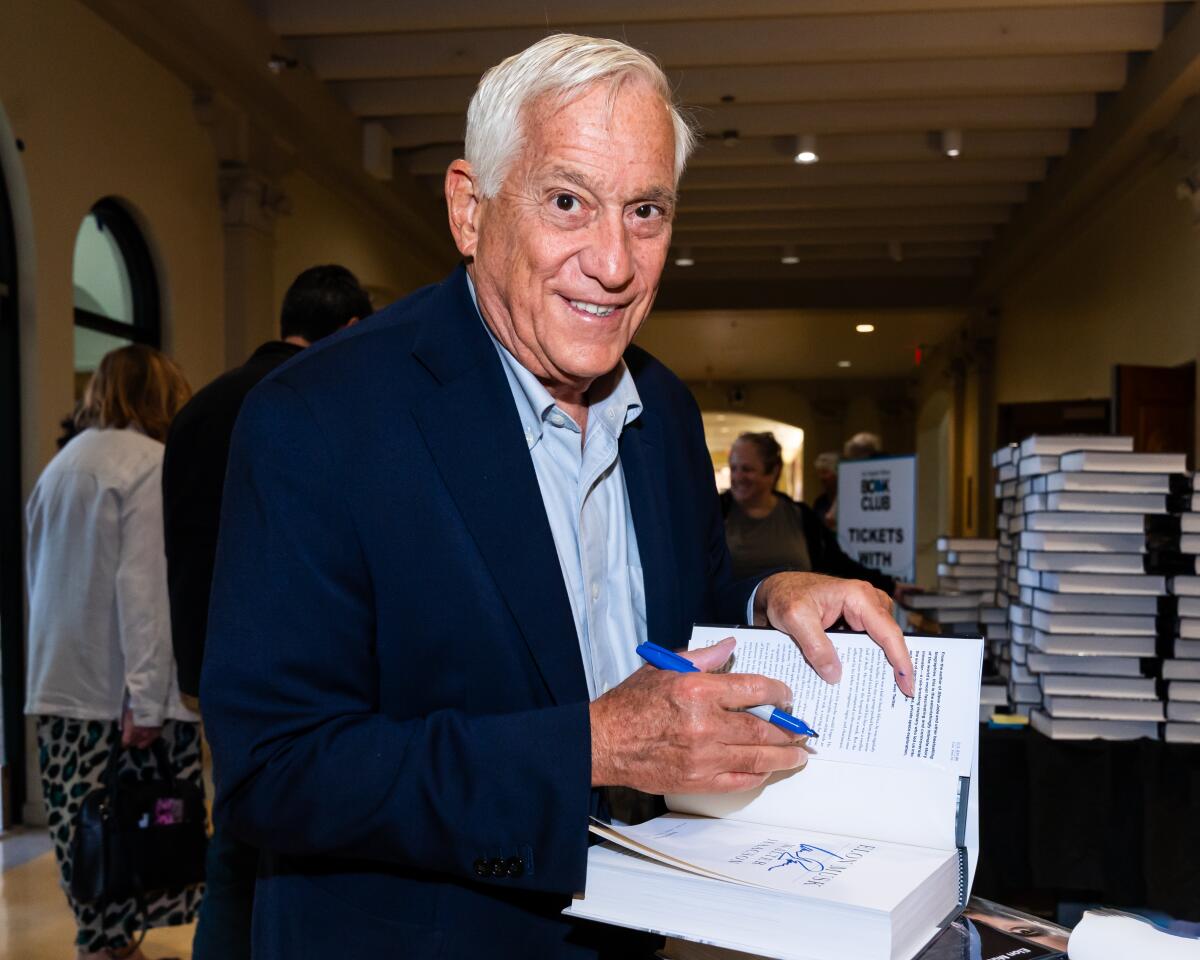
“I made a mistake on the (Steve) Jobs book,” Isaacson says of including too much information about the Apple co-founder’s children in his biography. He told columnist Anita Chabria he changed his approach when writing about Musk’s family.
Watch the entire conversation here.
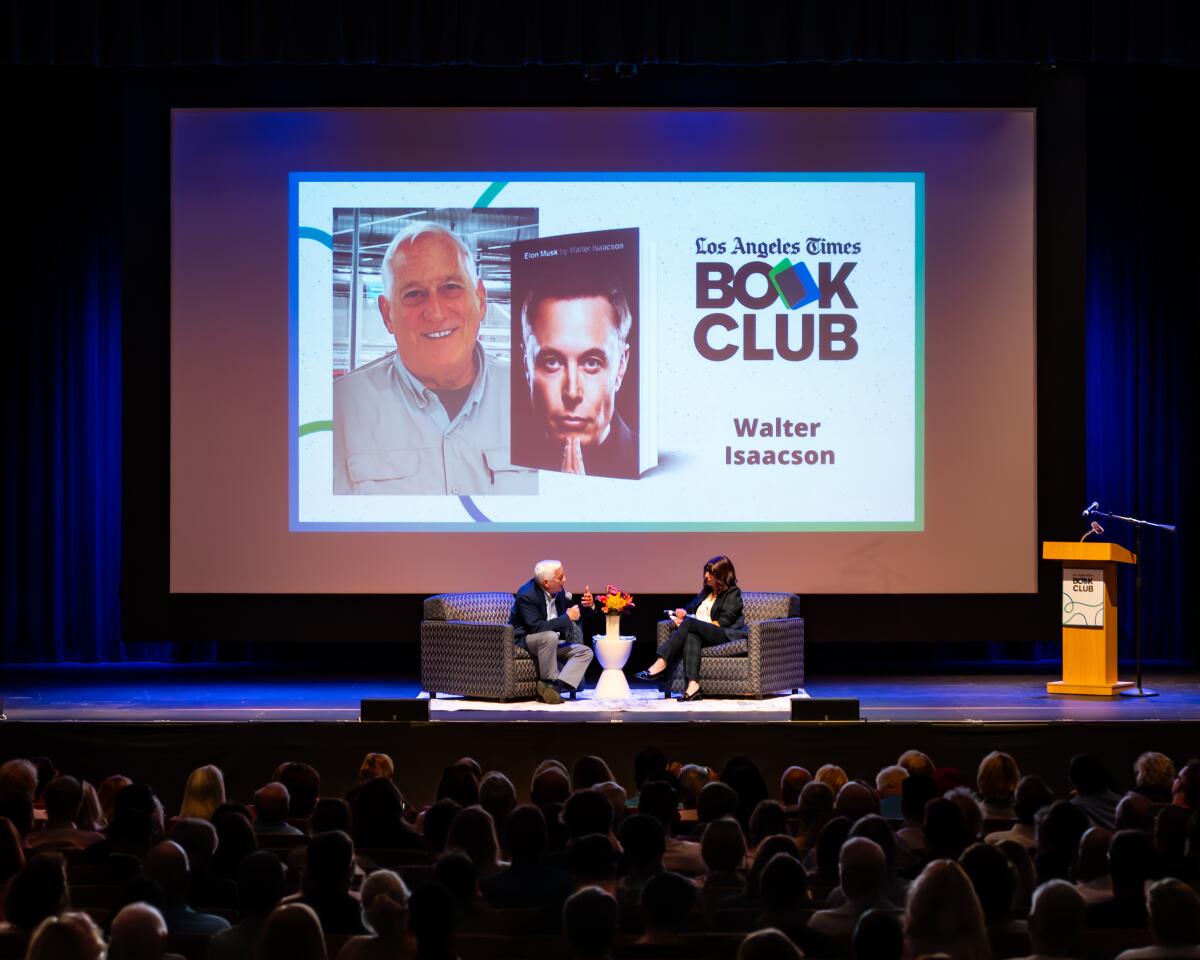
Sign up for our Book Club newsletter
Get the latest news, events and more from the Los Angeles Times Book Club, and help us get L.A. reading and talking.
You may occasionally receive promotional content from the Los Angeles Times.




